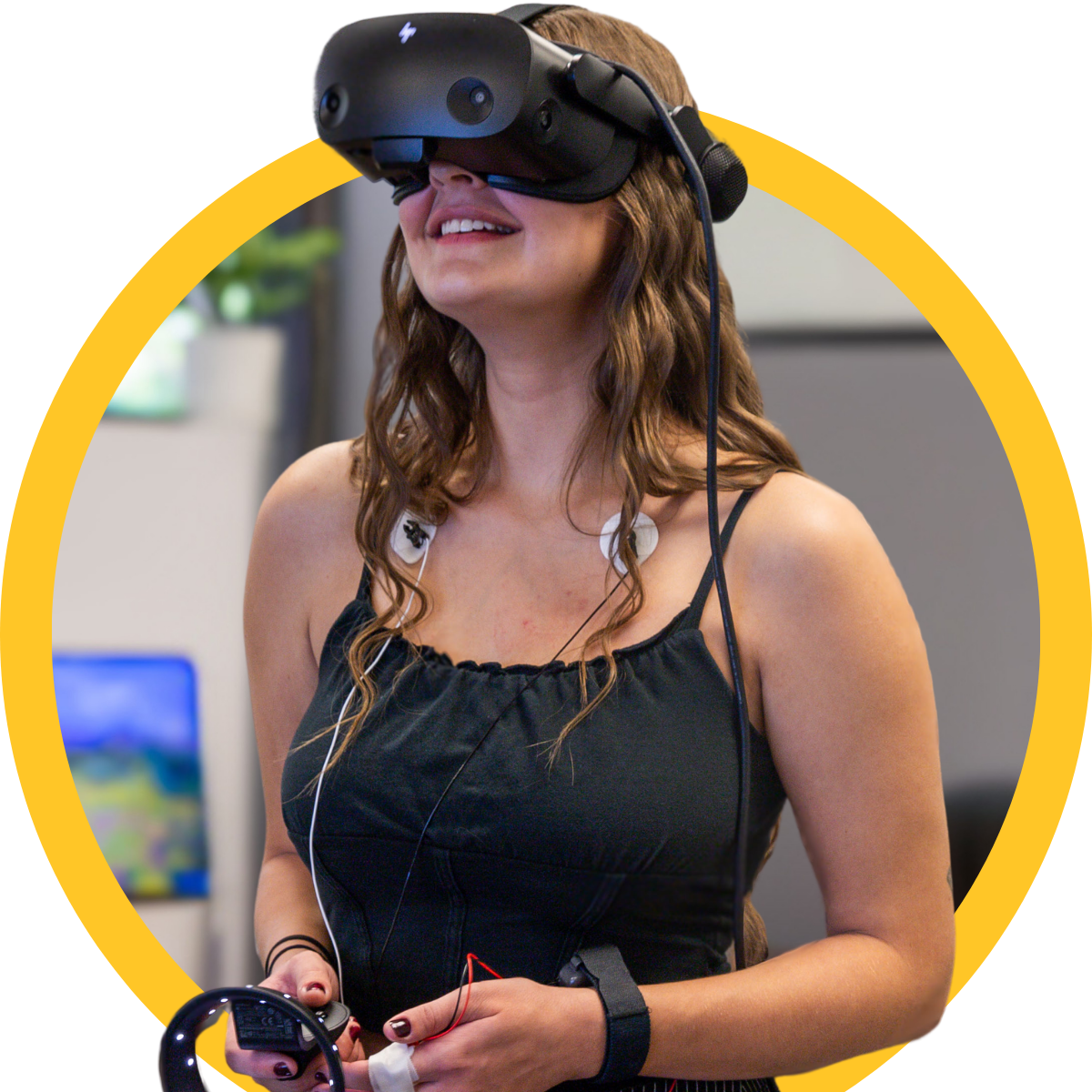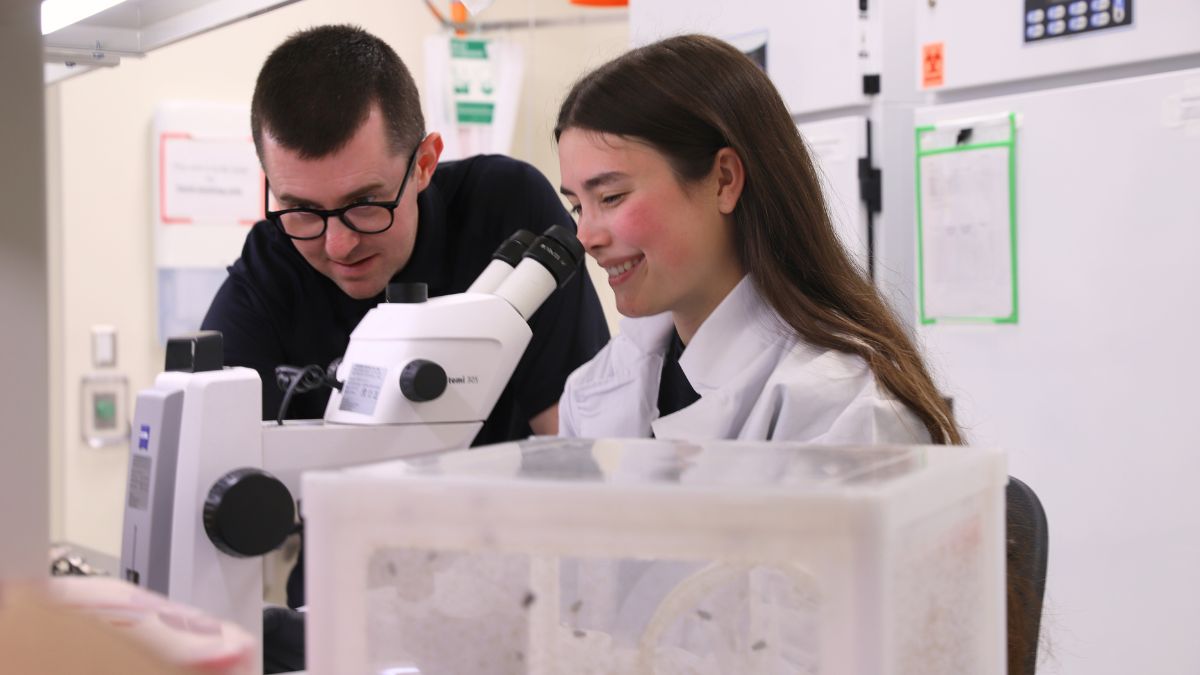Step 1: Explore our degrees
Investigate forensic problems using statistics, computing and mathematics to advance your forensic science knowledge and capabilities. Gain the skills and tools you need to work in the rapidly growing field of forensic science.
Program description
The Bachelor of Science in digital forensics is a multidisciplinary degree program that encompasses areas of physical, biological and social sciences with an additional focus on statistics and computation.
In this program, students develop the quantitative and computational methods that assist basic and applied research efforts in forensic science, establish or prove scientific basis in investigative procedures, and support forensic examiner casework. Through modeling, computer simulations and computer-based analysis and recognition, students gain an in-depth understanding of the forensic science discipline, the scientific method and the systematic approach to forensic science.
At a glance: program details
- Offered by: New College of Interdisciplinary Arts and Sciences
- Location: West Valley campus
- First Required math Course: MAT 270 - Calc w/Analytic Geometry I
- Math intensity: Substantial
Example careers
Example job titles and salaries listed below are not necessarily entry level, and students should take into consideration how years of experience and geographical location may affect pay scales. Some jobs also may require advanced degrees, certifications or state-specific licensure.
| Career | Growth | Median Salary |
|---|---|---|
| Biostatistician | 31.6% | $98,920 |
| Computer Scientist | 22.7% | $136,620 |
| Crime Scene Investigator | 12.6% | $63,740 |
| Data Analyst | -1.7% | $48,880 |
| Information Technology Manager (IT Manager) | 15.4% | $164,070 |
| Mathematical Science Assistant | 6.2% | $71,700 |
| Software Developer | 25.7% | $127,260 |
| Statistician | 31.6% | $98,920 |
Delve into a world where science meets the justice system, and gain practical experience in solving actual cases while learning scientific techniques for collecting and analyzing crime scene evidence.
Program description
Forensic science is the study and application of scientific methods to matters of law.
The Bachelor of Science program in forensic science is built on a solid foundation in biology and chemistry and is designed to develop students' basic and upper-level laboratory skills. Students complete holistic, rigorous coursework in the natural and mathematical sciences to prepare to enter a competitive workforce. The interdisciplinary nature of the program is distinctly designed to train students in forensic techniques as varied as crime scene collection, evidence analysis and mock courtroom testimony.
Along with completing coursework and gaining the necessary scientific skills to succeed in this field, students have the opportunity to gain practical experience in a laboratory setting through involvement in research or an internship. Students can conduct research under experts of varying forensic fields, including biology, entomology and anthropology. Students also may apply for and participate in forensic science internships sponsored by crime labs around the country. Internships are highly competitive.
Job applicants and students who are seeking a volunteer or internship position within a crime lab are required to undergo an extensive background check that includes a polygraph exam, fingerprinting and drug testing. Applicants can be disqualified for recent or past illicit drug use (including marijuana), felony convictions, drunk driving convictions or other reasons.
At a glance: program details
- Offered by: New College of Interdisciplinary Arts and Sciences
- Location: West Valley campus or Online
- First Required math Course: MAT 210 - Brief Calculus
- Math intensity: Moderate
Example careers
Example job titles and salaries listed below are not necessarily entry level, and students should take into consideration how years of experience and geographical location may affect pay scales. Some jobs also may require advanced degrees, certifications or state-specific licensure.
| Career | Growth | Median Salary |
|---|---|---|
| Biological Scientist (General) | 3.9% | $87,300 |
| Biological Technician | 4.7% | $49,650 |
| Chemical Technician | 3.2% | $50,840 |
| Chemist | 6.2% | $80,670 |
| Clinical Trial Manager | 4.8% | $144,440 |
| Crime Scene Investigator | 12.6% | $63,740 |
| Health Sciences Manager | 4.8% | $144,440 |
| Life Scientist | 5.2% | $83,930 |
| Medical Scientist | 9.8% | $99,930 |
When a death is suspicious or unexplained, when a John or Jane Doe is discovered, who will provide the answers? Gain practical experience and develop critical thinking and technical skills at the intersection of science, medicine and the judicial system by learning scientific techniques for investigating death.
Program description
Forensic science is the application of science to the law or legal procedures. The medicolegal death investigation system is responsible for conducting investigations that certify the cause and manner of death in unnatural or unexplained circumstances --- those associated with forensic investigations.
The Bachelor of Science program in forensic science with a concentration in death investigations is built on a solid foundation of anatomy, biology and chemistry, which develop students' basic and upper-level laboratory skills. Students complete holistic, rigorous coursework in the natural and mathematical sciences to prepare to enter a competitive workforce. The interdisciplinary nature of the program is distinctly positioned to train students in forensic techniques such as advanced mapping, scene photography, biological evidence analysis and mock courtroom testimony.
Along with completing coursework and gaining the necessary scientific skills to succeed in this field, students have the opportunity to gain practical experience in a laboratory setting by being involved in research or an internship. Students can conduct research under experts of varying forensic fields, including anthropology, biology, entomology, investigations and data science. Students also may seek to apply for and participate in forensic science internships sponsored by crime labs or medicolegal offices around the country. Students seeking a volunteer or internship position within a crime lab or medicolegal office (as well as job applicants) often are required to undergo an extensive background check that includes a polygraph exam, fingerprinting and drug testing. Applicants can be disqualified for recent or past illicit drug use (including marijuana), felony convictions, drunk driving convictions or other reasons.
At a glance: program details
- Offered by: New College of Interdisciplinary Arts and Sciences
- Location: West Valley campus or Online
- First Required math Course: MAT 210 - Brief Calculus
- Math intensity: Moderate
Example careers
Example job titles and salaries listed below are not necessarily entry level, and students should take into consideration how years of experience and geographical location may affect pay scales. Some jobs also may require advanced degrees, certifications or state-specific licensure.
| Career | Growth | Median Salary |
|---|---|---|
| Anthropologist/Archeologist | 4.2% | $63,940 |
| Anthropology Professor | 4% | $85,000 |
| Biological Scientist (General) | 3.9% | $87,300 |
| Crime Scene Investigator | 12.6% | $63,740 |
| Field Researcher | -3.8% | $60,410 |
| Forensic Specialist | 1.5% | $86,280 |
| Forest Ranger | 14.8% | $48,110 |
| Medical Scientist | 9.8% | $99,930 |
| Medical Social Worker | 9.6% | $60,280 |
Explore the intersection of human behavior and the law. Learn how forensic psychologists contribute to the legal system through psychological assessments, investigations, court testimonies and research.
Program description
Forensic psychology is the application of psychology to the law. The concentration in forensic psychology within the Bachelor of Arts program in psychology combines general training in psychology and specialized coursework in criminal law, criminal behavior, the diagnosis and treatment of mental disorders, and legal decision-making.
When courts are faced with cases in which a psychology-related question arises, they may turn to psychologists for help. For example, psychologists might assist the court in understanding a criminal's mental state at the time of a crime or in determining whether a particular jury might have been biased against a defendant based on his or her race. This is the realm of forensic psychology.
Students learn about the various roles for psychologists in the legal system, which helps them to discover which roles they might like to pursue through careers in mental health or criminal justice, or through graduate training.
All New College psychology programs have a quantitative research focus, equipping students with skills in critical thinking, statistical analysis and academic writing. The Bachelor of Science degree differs from the BA degree in that it requires additional lab science coursework and advanced statistical training, both of which are increasingly important for destinations in research or clinical practice. The BA degree allows for exposure to a wider breadth of psychological and related topics through additional elective coursework. Both pathways provide a strong foundation for future graduate studies.
At a glance: program details
- Offered by: New College of Interdisciplinary Arts and Sciences
- Location: West Valley campus or Online
- First Required math Course: MAT 119 - Finite Mathematics
- Math intensity: Moderate
Example careers
Example job titles and salaries listed below are not necessarily entry level, and students should take into consideration how years of experience and geographical location may affect pay scales. Some jobs also may require advanced degrees, certifications or state-specific licensure.
| Career | Growth | Median Salary |
|---|---|---|
| Behavioral Health Specialist | 6.6% | $61,420 |
| Detective Sergeant | 1.5% | $86,280 |
| Lawyer | 7.5% | $135,740 |
| Licensed Clinical Psychologist | 11.4% | $90,130 |
| Mental Health Counselor | 18.4% | $49,710 |
| Probation Officer | 2.5% | $59,860 |
| Psychiatrist | 6.7% | $226,880 |
| Social Worker | 5.3% | $50,820 |
| Substance Abuse Social Worker | 10.6% | $51,240 |
Explore the intersection of human behavior and the law. Learn how forensic psychologists contribute to the legal system through psychological assessments, investigations, court testimonies and research.
Program description
Forensic psychology is the application of psychology to the law. The concentration in forensic psychology within the Bachelor of Science program in psychology combines general training in psychology and specialized coursework in criminal law, criminal behavior, the diagnosis and treatment of mental disorders, and legal decision-making.
When courts are faced with cases in which a psychology-related question arises, they may turn to psychologists for help. For example, psychologists might assist the court in understanding a criminal's mental state at the time of a crime or whether a particular jury might have been biased against a defendant based on his or her race. This is the realm of forensic psychology.
Students learn about the various roles of psychologists in the legal system, which helps them to discover which roles they might like to pursue through careers in mental health or criminal justice, or through graduate training.
All New College psychology programs have a quantitative research focus, equipping students with skills in critical thinking, statistical analysis and academic writing. The BS degree differs from the Bachelor of Arts degree in that it requires additional lab science coursework and advanced statistical training, both of which are increasingly important for destinations in research or clinical practice. The BA degree allows for exposure to a wider breadth of psychological and related topics through additional elective coursework. Both pathways provide a strong foundation for future graduate studies.
At a glance: program details
- Offered by: New College of Interdisciplinary Arts and Sciences
- Location: West Valley campus or Online
- First Required math Course: MAT 119 - Finite Mathematics
- Math intensity: Moderate
Example careers
Example job titles and salaries listed below are not necessarily entry level, and students should take into consideration how years of experience and geographical location may affect pay scales. Some jobs also may require advanced degrees, certifications or state-specific licensure.
| Career | Growth | Median Salary |
|---|---|---|
| Behavioral Health Specialist | 6.6% | $61,420 |
| Counselor (General) | 17.2% | $43,390 |
| Detective Sergeant | 1.5% | $86,280 |
| Lawyer | 7.5% | $135,740 |
| Licensed Clinical Psychologist | 11.4% | $90,130 |
| Mental Health Counselor | 18.4% | $49,710 |
| Neuropsychologist | 5.1% | $106,420 |
| Probation Officer | 2.5% | $59,860 |
| Psychiatrist | 6.7% | $226,880 |
| Social Worker | 5.3% | $50,820 |
| Substance Abuse Social Worker | 10.6% | $51,240 |

The only interdisciplinary forensic school in the nation.
We are unified by our common purpose to pioneer and apply science to improve the legal system and protect people and society.
We bring together the broadest and deepest bench of expertise to produce groundbreaking and impactful research, innovate systems, and prepare students with the tools, knowledge, and collaborative initiative needed to address our most complex judicial cases and processes.


Step 3: How and when to apply to ASU
Applying to ASU is a fairly easy process and usually doesn’t take more than 30 minutes to complete. ACT or SAT scores are not required for admission or to be considered for an ASU merit-based scholarship. The earlier you apply to ASU, the sooner you will receive an admission decision.
- Complete an undergraduate admission applicationTo expedite the admission decision, self-report your high school grades in the application.
- Submit the nonrefundable application feeArizona residents: $50; Domestic nonresidents: $80; ASU Online: $70; International nonresidents: $85
- TranscriptsIf you do not self-report your high school grades in the application, you must have your high school send an official copy of your transcripts to ASU
- ACT or SAT scores (optional)ACT or SAT scores are not required for admission, but may be submitted for ASU course placement or as supplemental information.
- Check application statusOnce you’ve completed all these steps, ASU will review your application.
- Fill out the FAFSAThe Free Application for Federal Student Aid is used to award grants, loans, Federal Work-Study and certain scholarships.
